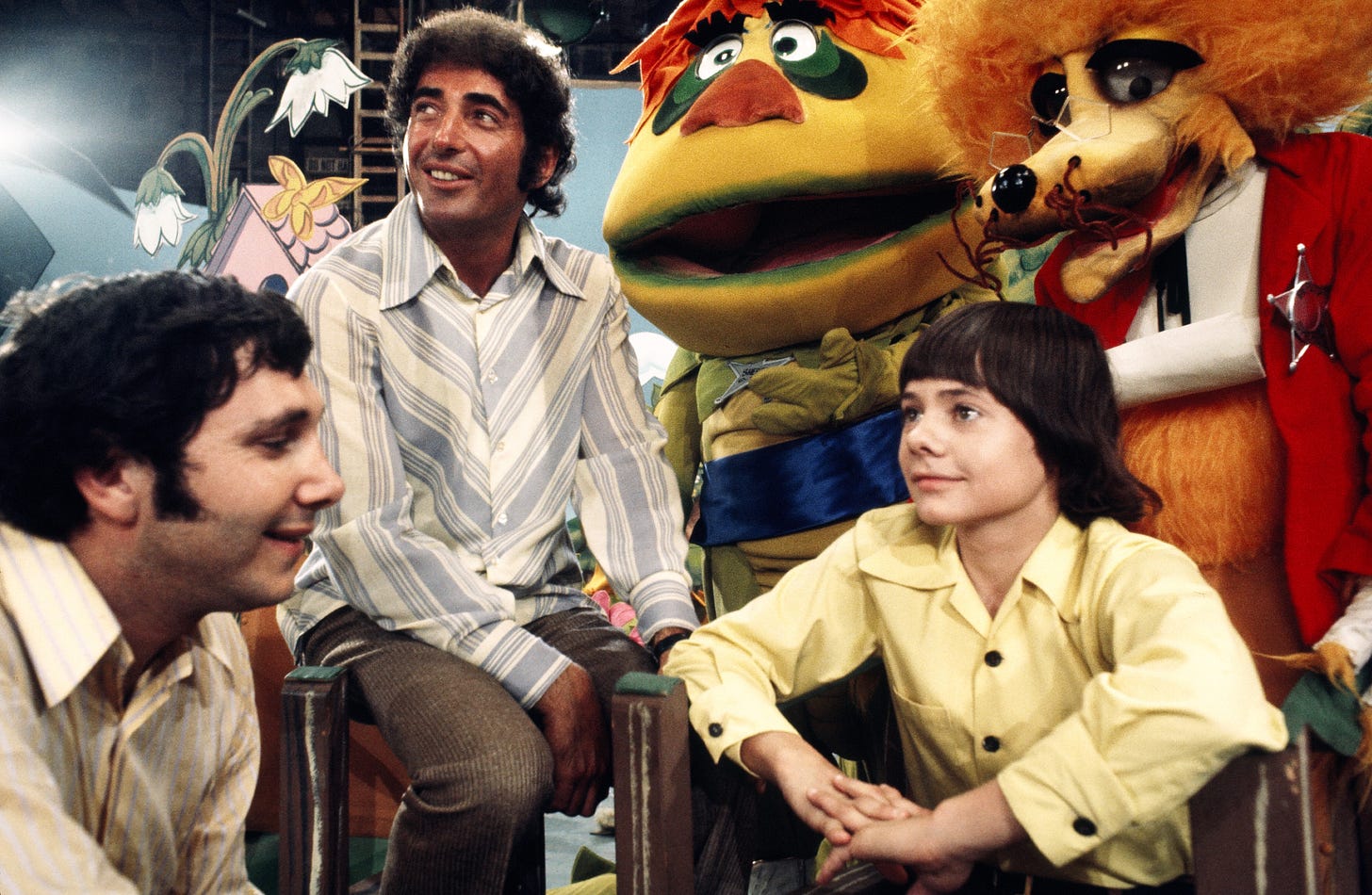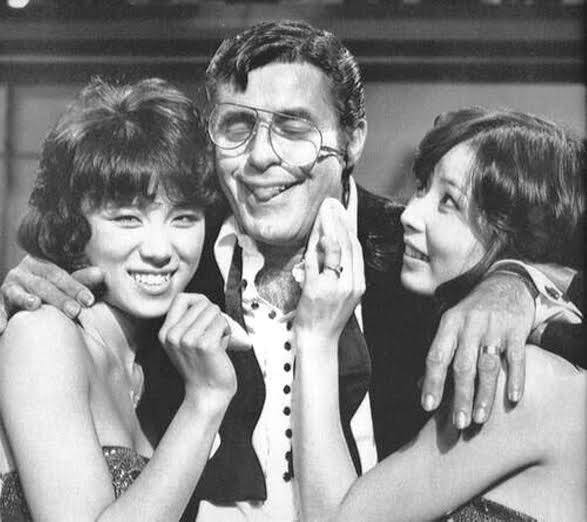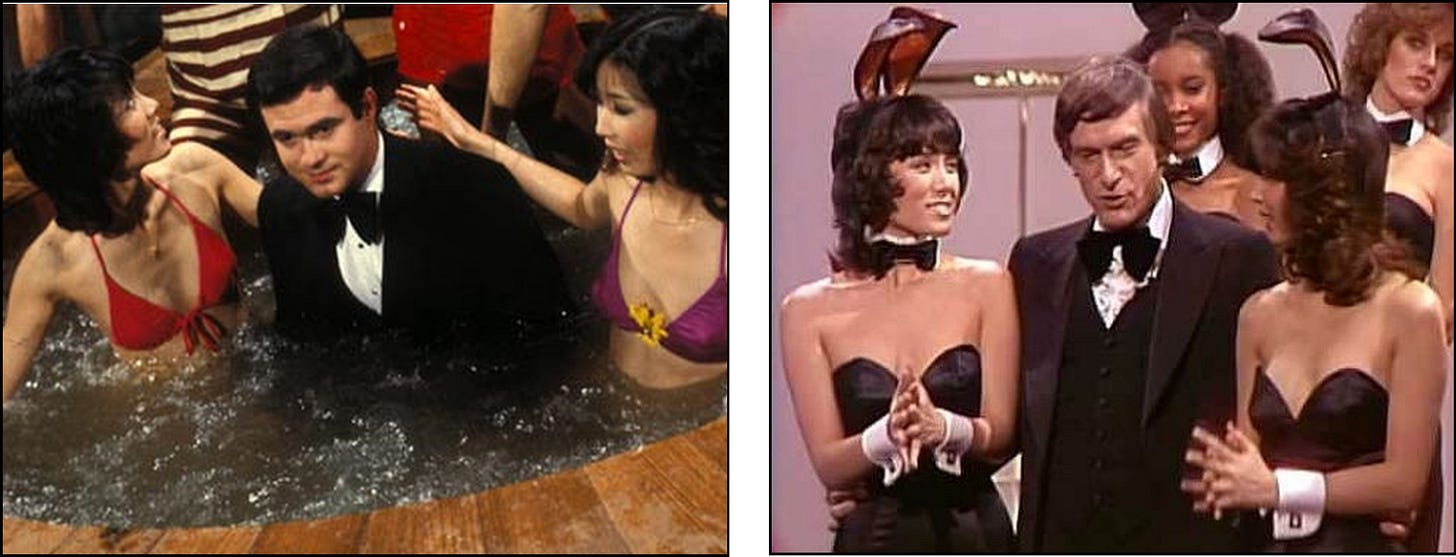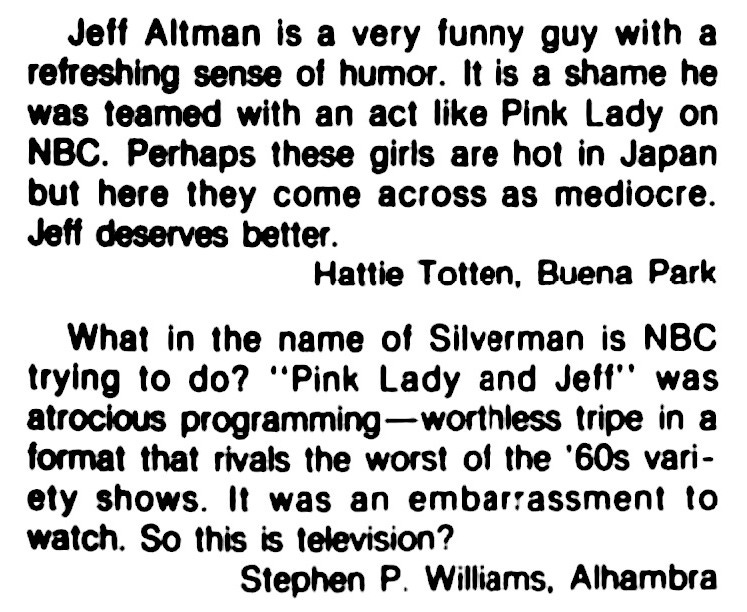INTERVIEW: Marty Krofft & the Making of PINK LADY AND JEFF!
Legendary TV producer claims, "You couldn't kill this show with a baseball bat!"
For millions of kids growing up in the seventies, the names "Sid and Marty Krofft" evoked a unique kind of television experience. Krofft shows like H.R. Pufnstuf, The Bugaloos, Sigmund and the Sea Monsters, Land of the Lost, etc, were stupefying in their "Peter Max meets the Wizard of Oz" surrealistic intensity. They functioned as the perfect foil to "socially redeeming" and "educational" children's shows like Sesame Street and other PBS fare. Better than merely teaching us how to count to ten, The Krofft Supershow helped us get the hell off Planet Earth for a while.
Yet underneath all the puppets and krazy kostumes was a bedrock of well-honed, old-fashioned showbiz instinct. Prior to teaming up with brother Marty, puppeteer Sid Krofft played Las Vegas and appeared twice on Ed Sullivan. In some respects, the primetime variety shows that the Kroffts produced during their heyday offer the purest, and sometimes most pungent, form of their aesthetic. Some, like the Donny and Marie Show (1976-1979) and Barbara Mandrell and the Mandrell Sisters (1980-1982), proved to be hits. Others, like 1977's The Brady Bunch Hour and 1980's Pink Lady and Jeff (both directed by the late Art Fisher), died horribly in their infancy.
Although considered embarrassing failures in their own time, the once reviled pair of latter shows have since generated far more interest and devotion than the initially successful ones probably ever will. This much is evident in Rhino's VHS and deluxe DVD editions of both The Brady Bunch Variety Hour and Pink Lady and Jeff.
Marty Krofft was generous to enough to spare a few moments on the phone before dashing off to Paramount to draw up battle plans for a brand new H.R. Pufnstuf feature film. As someone who grew up with both his kid shows and variety hours, it was a genuine honor to speak with the man who freely admits to spending the seventies messing with little kids' minds.
Well, that would explain Charles Nelson Reilly with his face painted green in Lidsville. But what about Pink Lady and Jeff?
TokyoScope: What was the Krofft philosophy, or formula so to speak, when it came to producing variety shows for primetime TV?
MARTY KROFFT: First you had to find a star that a network would pick up. There was always a fine line as to who you could get and who could make it happen. Of course you always have to find some gimmick that you hope will catch on, too. With Donny and Marie it was ice skating. With Barbara Mandrell, of course, it was country music.
Where did the idea to do a Pink Lady show come from?
On that one, I got a call from [president of NBC] Fred Silverman, and he asked me if I would do it. He sent me a tape of Walter Cronkite, who had done a three minute piece on these girls who were major music stars in Japan. I was told that they could speak English. That was the first lie. They could hardly speak English at all. So we did not have an easy time getting this thing pulled together.
Was Pink Lady an attempt to try and do something new with the variety format?
We were always trying to do something new. In this case, this show only had five episodes [the sixth episode was produced but never broadcast], but now it's in the time capsule. You couldn't kill this show with a baseball bat. On Saturday Night Live they were doing spoofs of us for two or three years. So I think that it was definitely [dramatic pause] unusual. I figure we had some problems, looking back at it. Having two Japanese girls who didn't speak English, and with all the hostages being held in Iran, this would not go together with the American public. I think the American public at that point was closed down on something coming from far away. We also had The Dukes of Hazzard on opposite, so that didn't help. It was an uphill battle. We put big stars on this show. Paid tons of money to get them, and that didn't help. We taught them English phonetically. They got a little more savvy. You're doing that. You're doing translation. You're taking some of the blood out of the thing. But in Japan, let's face it, they were major.
There was another musical act you brought in from overseas to star in their own show.
The Bay City Rollers, right.
How did working with Pink Lady compare?
It was definitely different working with Pink Lady. Probably a lot easier [laughs]! It was tough working with the Rollers. The only thing that happened with Pink Lady was that Kei had a boyfriend in Japan, and I was always looking for her and she'd be on the telephone. That was about the worst.
With the bikinis and hot tub, the show seemed a bit racier than any other previous Krofft show.
Well, it was a nine o'clock show and not an eight o'clock, so it did get a little more adult. Eight o'clock is family hour. With Barbara Mandrell and Donny and Marie, those two played at eight and they worked. Around 1980 we were doing a movie, Middle Age Crazy starring Bruce Dern and Ann-Margret [co-written by Jerry Lee Lewis with the tagline, "There'll be a hot time in the hot tub tonight!" -PM], and that was rather adult. So we did things that we believed in and we wanted to do. But Krofft wasn't going to do anything heavily raunchy. I think we were pretty synonymous with family entertainment, so whenever we stepped out of that it was a leap. I don't think [Pink Lady] was a leap. The hot tub? That was not a leap. I appreciate you telling me it was. I wish it had been a leap [laughs].
What were the demographics you were trying to target with the show?
Anybody we could get. I guess 18 to 49 was the magic number. Guys. Men. Pull in the men audience, which is important.
What was the internal reaction to the finished product?
When we didn't get the ratings, we got the reaction. In television, the numbers rule. Crappy show, great show, good numbers-fine. Great show, bad numbers-bad. That's where it all lies. It was yanked.
Did you get the sense that Pink Lady may have wanted out early on?
I'm sure they did, but they had a contract [laughs]. I'm sure one of them did at least. Nah. The network made a decision that this wasn't going to happen. It was a hole in the lineup. So that was too bad. We put a lot of energy into that show. Just getting them to speak English was a big deal.
How was Jeff Altman to work with?
Jeff is a pro. He held it together and he knew what he wanted to do. So he was a big help there. He was not difficult.
He seems to think that he may have caused tension by continually pushing for a different style of humor. He thinks there was the potential to do an edgier, almost David Letterman-esque show, but the old-fashioned variety format and gags won out.
That's what the network wanted. David Letterman never made it in prime time. If you went to Letterman, you would have automatically died. Look. Jeff was talented. Jeff was unknown. The girls were unknown. It's tough to pull that off in a variety format. Barbara Mandrell was a name. Donny and Marie had been around since the Andy Williams days. I did The Brady Bunch Hour, which was a big name. If you had a name, at least you had a shot.
So in the end, who was held accountable for the show's cancellation?
Who was held accountable? I guess we were. Sid and Marty Krofft [laughs]. It was our show. The buck stops with us. We did what we thought was the best we could. When I did a presentation tape, a pilot, it was tough to put fifteen minutes together. This was not an effort. Blame all you want, but it was our show. We were responsible, whatever the reasons were.
How did you guys manage to keep your faith in the variety show format? Later the same year you came out with the Mandrell show.
The variety show had been around for a while. Variety only got killed by MTV. The minute MTV hit, variety died. You do a music video, and we couldn't compete with you. We are a show biz-oriented company. We are not guys who got an MBA at Dartmouth and came into television through our law degree. We were performers. Entertainers. We were the opening act for Judy Garland. It was natural for us to do variety. There are no people left to do it, basically. Most of them are old or dead. The medium is dead, but it's coming back, I bet you. The real rocks of ideas, you can't kill them. They're always around in one form or another. With all this reality stuff, the next thing will pop up somewhere. TV is always going to be in transition, because something is always happening.
It seems like your kids' shows are destined to live on because the audience literally grew up watching them. How do you account for the popularity of your variety shows?
Fortunately, there seems to be an interest in Krofft in general. I think what we did was mess with little kids' minds in the seventies and they never left us. Whereas Disney's kids from the seventies couldn't care less. Whatever we did, we have unbelievably loyal fans. These Pink Lady tapes will probably sell though the roof. There's kind of a Krofft mystique about what went on. People want to know stories, how did we do it, what kind of shape we were in. I think there's none of that for Hanna-Barbera or Walt Disney. People are always trying to figure out what we're all about. So are we.













